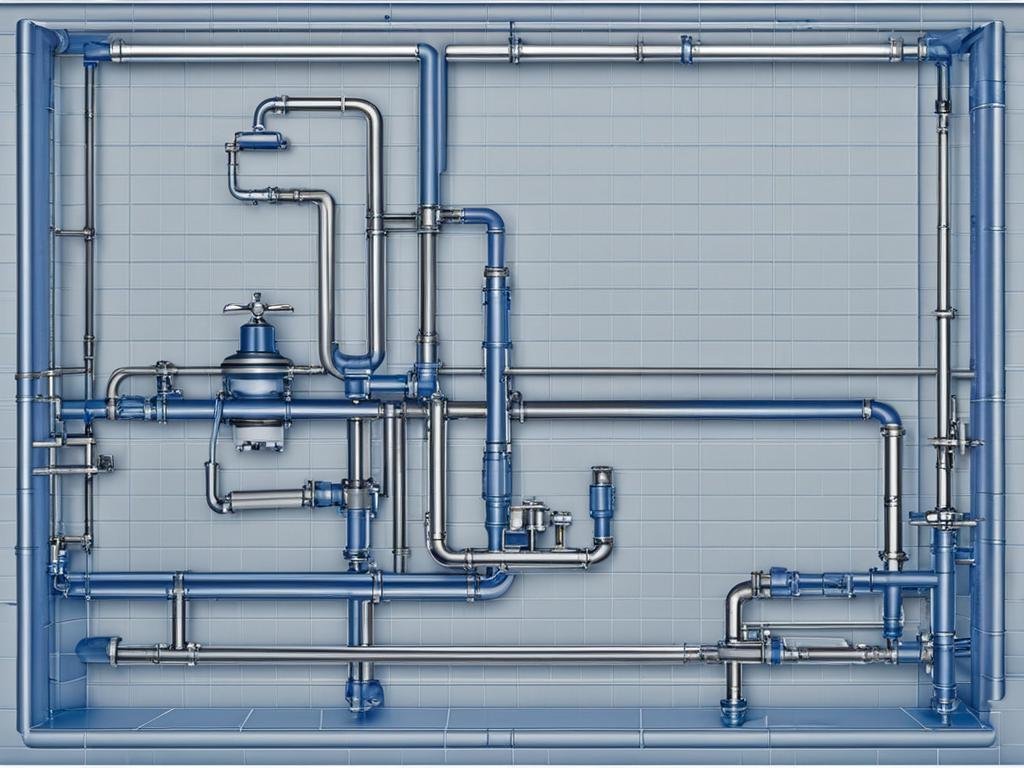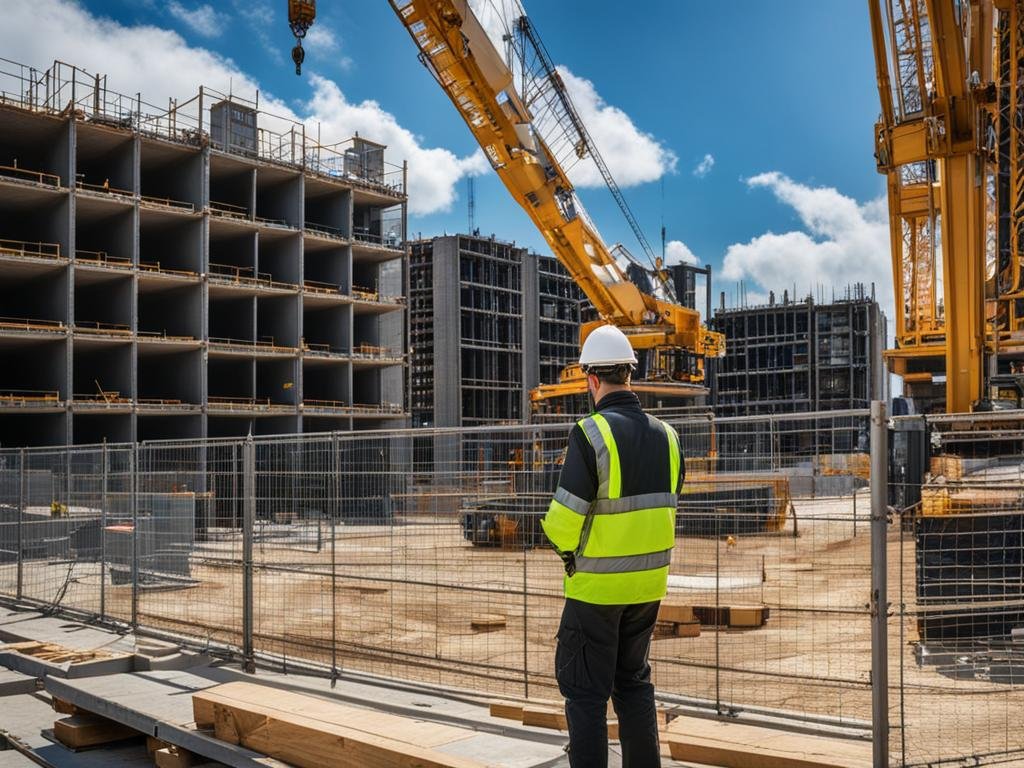Construction engineering is a dynamic field that combines civil engineering and construction management principles. It involves the design, planning, and execution of building projects, ensuring that they are completed safely, efficiently, and to the highest standards. To excel in the field of construction engineering, it is crucial to have a solid understanding of blueprint reading, project management techniques, and construction materials and techniques.
Key Takeaways:
- Construction engineering combines civil engineering and construction management principles.
- Blueprint reading, project management techniques, and construction materials are essential knowledge for construction engineers.
- Construction projects must be completed safely, efficiently, and to the highest standards.
- Understanding blueprint reading is crucial for visualizing and executing construction projects.
- Construction project management involves planning, coordination, and supervision to ensure successful project completion.
The Basics of Blueprint Reading
Blueprint reading is an essential skill for construction professionals, including contractors, architects, engineers, and construction managers. It enables them to interpret and understand construction plans, which serve as a visual roadmap for a construction project. Effective blueprint reading is crucial for ensuring accurate communication, precise execution, and adherence to project specifications.
Construction plans contain a wealth of information that professionals must decipher. This includes various symbols, dimensions, and specifications that are crucial for understanding the project’s scope, materials, and design. By mastering the art of blueprint reading, construction professionals can confidently interpret and visualize a project, enabling them to effectively manage and guide the construction process.
Blueprint reading is like deciphering a complex language unique to the construction industry. It requires a keen eye for detail, an understanding of construction principles, and the ability to connect the dots between the plan and the physical structure. – John Smith, Construction Engineer
Blueprint Symbols
Blueprints use symbols to represent different elements of a project, such as doors, windows, electrical outlets, and plumbing fixtures. These symbols help professionals identify and locate specific features within the construction plan. For example, a small circle with a cross represents an electrical outlet, while a dashed line indicates a hidden or concealed feature.
Dimensions and Specifications
Dimensions and specifications are essential components of construction plans. Dimensions provide precise measurements for the placement of various elements, ensuring accuracy during construction. Specifications outline the materials, finishes, and quality standards required for each component of the project. These details help professionals understand how different elements fit together and ensure compliance with project requirements.
| Symbol | Description |
|---|---|
| https://www.youtube.com/watch?v=Q1XAtVXxH0w | An electrical outlet symbol indicates the location and type of electrical outlet required in the construction project. |
 |
A plumbing fixture symbol represents the placement and type of plumbing fixture, such as a sink or toilet, within the construction project. |
 |
A door symbol indicates the location and type of door required in the construction project, including swing direction and size. |
By familiarizing themselves with blueprint symbols, dimensions, and specifications, construction professionals can accurately interpret construction plans and effectively communicate with project stakeholders. This knowledge is essential for ensuring a smooth construction process and delivering successful projects that meet client expectations.
The Role of Construction Project Management
Construction project management plays a critical role in the construction industry, ensuring the successful planning, coordination, and supervision of projects from start to finish. It encompasses various tasks, including project planning, project coordination, project supervision, and project completion. With the help of experienced project managers, construction projects can be executed efficiently, on time, and within budget, while meeting the highest quality standards.
A Closer Look at Construction Project Management
Project planning is an integral part of construction project management. It involves defining project objectives, determining project scope, and outlining the tasks and activities required to achieve those objectives. A thorough project plan takes into account factors such as project timeline, resource allocation, and budget considerations. By creating a comprehensive project plan, project managers can effectively manage the various aspects of construction projects and ensure their successful execution.
Effective Coordination and Supervision
Construction project management also involves coordinating and supervising the work of various stakeholders, including architects, engineers, contractors, and subcontractors. It requires effective communication and collaboration to ensure that all parties are aligned with project objectives and timelines. Project managers play a crucial role in overseeing the progress of construction projects, conducting regular site visits, and resolving any issues that may arise during the construction process.
The ultimate goal of construction project management is to ensure the timely completion of a project while meeting all quality and safety standards. By overseeing every aspect of the project, from planning to completion, project managers contribute to the successful delivery of construction projects, providing clients with high-quality structures that meet their requirements and specifications.

| Key Responsibilities | Role in Project Success |
|---|---|
| Project planning | Ensures clear objectives and a well-defined plan |
| Project coordination | Facilitates effective communication and collaboration among stakeholders |
| Project supervision | Oversees progress and ensures compliance with project requirements |
| Project completion | Delivers a finished project on time and within budget |
Construction Materials and Techniques
Construction materials and techniques play a crucial role in the successful completion of construction projects. From choosing the right materials to utilizing innovative construction techniques and technology, construction engineers and managers must stay updated with the latest advancements in the industry.
When it comes to construction materials, there is a wide range of options available, each with its unique characteristics and applications. From traditional materials like concrete, steel, and wood to modern alternatives like composite materials and sustainable solutions, understanding the properties and limitations of different materials is essential for achieving project specifications and design standards.
Additionally, construction techniques have evolved over time, offering innovative and efficient methods for building construction. Advanced construction technologies such as prefabrication, modular construction, and 3D printing have revolutionized the industry, allowing for faster construction, reduced costs, and improved sustainability.

The Role of Design Standards
Design standards serve as guidelines for construction professionals, ensuring that structures are built to meet safety, durability, and functionality requirements. These standards encompass various aspects, including structural design, building codes, fire safety, accessibility, and sustainability. By adhering to design standards, construction engineers and managers can ensure that their projects are compliant with industry best practices and regulatory requirements.
| Construction Materials | Advantages | Disadvantages |
|---|---|---|
| Concrete | Durable, fire-resistant, versatile | Heavy, requires skilled labor |
| Steel | High strength, flexible, recyclable | Costly, susceptible to corrosion |
| Wood | Renewable, cost-effective, easy to work with | Prone to decay, susceptible to pests |
Table: Advantages and Disadvantages of Common Construction Materials
By combining the right construction materials with effective construction techniques, professionals can create structures that not only meet project specifications but also contribute to the overall sustainability and longevity of the built environment.
The Importance of Feasibility Studies in Construction
Feasibility studies play a crucial role in the successful execution of construction projects. These studies assess the viability of a project and identify any potential challenges that may arise. By conducting a thorough feasibility study, construction professionals can gain a comprehensive understanding of the project’s requirements and determine whether it is financially, legally, and technically feasible.
During a feasibility study, various factors are considered, including project viability, project challenges, regulatory requirements, and budget considerations. The study helps stakeholders make informed decisions and mitigate risks before initiating the construction process.
“A feasibility study is like a compass that guides construction professionals through the complex landscape of project planning, offering valuable insights into the project’s potential obstacles and facilitating informed decision-making.”
Feasibility studies involve a detailed analysis of the project’s scope, market demand, environmental impact, and financial projections. The study helps in identifying potential risks and determining the project’s profitability. It also provides a roadmap for project implementation, outlining the necessary steps and resources required.
| Importance of Feasibility Studies in Construction | Benefits |
|---|---|
| 1. Assesses project viability | Ensures that the project is feasible from technical, financial, and legal perspectives. |
| 2. Identifies project challenges | Helps in anticipating and addressing potential challenges, such as regulatory requirements and environmental impact. |
| 3. Guides decision-making | Provides stakeholders with valuable insights to make informed decisions and mitigate risks. |
| 4. Determines project profitability | Evaluates the financial viability of the project and its potential return on investment. |
| 5. Outlines project implementation | Defines the necessary steps, resources, and timeline for successful project execution. |
By conducting thorough feasibility studies, construction professionals can ensure that their projects are well-planned, financially sound, and compliant with applicable regulations. These studies contribute to the overall success of construction projects by minimizing uncertainties and setting a solid foundation for the construction process.

The Phases of Construction Project Management
Construction project management encompasses several distinct phases that ensure the successful delivery of a construction project. Each phase has its unique tasks and objectives, contributing to the overall efficiency, timeliness, and quality of the project. Understanding these phases is essential for construction professionals involved in project initiation, planning, execution, monitoring, control, and completion.
Project Initiation
The project initiation phase marks the beginning of a construction project. During this phase, the project’s feasibility and viability are assessed, including its alignment with organizational goals, budgetary considerations, and regulatory requirements. This phase involves conducting comprehensive feasibility studies, defining project objectives and scope, and obtaining necessary approvals and permits.
Project Planning
Project planning is a crucial phase that establishes the roadmap for the entire project. It involves creating a detailed project plan, setting timelines, allocating resources, and defining project milestones. Additionally, this phase includes developing strategies to mitigate potential risks, ensuring compliance with safety regulations, and coordinating the efforts of various stakeholders.
Project Execution, Monitoring, and Control
The execution, monitoring, and control phase is where the actual construction work takes place. Construction activities are executed according to the project plan, and progress is continuously monitored to ensure adherence to timelines, quality standards, and budgetary constraints. It also involves implementing effective project controls, such as regular inspections, progress reports, and adjustments to mitigate risks and maintain project alignment.
Throughout this phase, project managers closely collaborate with construction teams, contractors, and subcontractors to manage resources, resolve issues, and keep stakeholders informed about project status and any necessary adjustments.
Project Completion
The final phase of construction project management is project completion. This phase involves conducting a comprehensive project review to ensure that all objectives have been met, the project is fit for purpose, and any necessary documentation is completed. It includes final inspections, testing, and obtaining necessary certifications. A successful project completion is marked by the handover of the completed project to the client or end user, while ensuring that all contractual obligations are fulfilled.
By understanding and effectively managing each of these phases, construction project managers can navigate the complexities of construction projects, mitigate potential risks, and deliver projects that meet or exceed client expectations.
| Phase | Description |
|---|---|
| Project Initiation | Assess project feasibility, define objectives and scope, obtain approvals and permits |
| Project Planning | Create project plan, set timelines, allocate resources, identify risks, ensure compliance |
| Project Execution, Monitoring, and Control | Execute construction activities, monitor progress, enforce quality standards, adjust as needed |
| Project Completion | Conduct final inspections, ensure project objectives are met, handover completed project |

“The success of a construction project heavily relies on the effective management and coordination of its various phases. From initiation to completion, construction project managers play a crucial role in ensuring that projects are executed efficiently, on time, and within budget.”
The Role of Project Managers in Construction
In the world of construction projects, project managers play a crucial role in ensuring the successful coordination and execution of various tasks. These skilled professionals are responsible for overseeing the entire project from start to finish, working closely with stakeholders to achieve project objectives within the given timeline and budget. Their expertise in project management techniques and construction knowledge allows them to navigate the complexities of construction projects effectively.
Project managers are the driving force behind project coordination, ensuring that all team members are aligned and working towards a common goal. They oversee the planning, scheduling, and sequencing of activities, making sure that each task is completed in the right order and at the right time. By effectively managing resources, allocating budgets, and maintaining clear communication, project managers keep construction projects on track and within budget.
Furthermore, project managers are adept at problem-solving, anticipating potential issues and implementing proactive measures to mitigate risks. Their ability to think critically and make informed decisions under pressure is vital in addressing unforeseen challenges that may arise during construction projects. By efficiently managing these challenges, project managers maintain project momentum and minimize delays.
The Role of Project Managers
- Coordinate and oversee construction projects
- Ensure project objectives are met
- Manage project timeline and budget
- Facilitate communication between stakeholders
- Implement risk management strategies
- Proactively address challenges and resolve issues
“A project manager is like a conductor, ensuring that all elements of the construction project come together harmoniously.”
Project managers not only possess technical knowledge but also possess strong leadership and communication skills. They are effective in driving collaboration among different teams within a construction project, including architects, engineers, contractors, and regulatory authorities. With their ability to communicate clearly, project managers foster a positive working environment and ensure that everyone involved is well-informed and working towards the same goal.
In conclusion, project managers are the linchpin of construction projects, playing a vital role in project coordination and ensuring the successful delivery of construction projects. Their expertise in project management, leadership, and problem-solving allows them to navigate the complexities of construction projects, ensuring that project objectives are met, timelines are adhered to, and budgets are maintained.

The Significance of Quality Control in Construction
Quality control plays a pivotal role in ensuring the success of construction projects. It involves implementing measures to maintain and enhance the quality of workmanship, materials, and processes throughout the construction process. By adhering to construction standards and specifications, conducting regular inspections, and maintaining detailed project documentation, construction professionals can deliver projects that meet industry requirements and exceed client expectations.
Effective quality control not only ensures that construction projects are built to last, but it also enhances safety and reduces the risk of errors and defects. By implementing stringent quality control measures, construction teams can identify and address any issues promptly, minimizing delays and costly rework.
One of the key aspects of quality control in construction is the adherence to construction standards and specifications. These standards define the minimum requirements for construction materials, methods, and practices, ensuring that the end result is safe, durable, and compliant with regulations. By consistently monitoring and enforcing these standards, construction professionals can maintain a high level of quality throughout the project.
In addition to adhering to standards, regular project inspections are crucial for identifying any deviations from the approved plans and specifications. Inspections help ensure that construction work is being carried out correctly and in accordance with the approved design. Any non-compliance or deficiencies can be identified and rectified promptly, preventing potential issues from escalating into larger problems.
Project documentation also plays a vital role in quality control. Detailed documentation allows construction professionals to track the progress of the project, record any changes or deviations, and ensure that all necessary approvals and permits are obtained. It serves as a valuable reference throughout the project and can also provide valuable insights for future projects.
Table: Key Components of Quality Control in Construction
| Component | Description |
|---|---|
| Adherence to Construction Standards and Specifications | Ensuring that all construction work meets the required standards and specifications, including materials, methods, and practices. |
| Regular Inspections | Conducting regular inspections to verify that construction work is being carried out correctly and in accordance with the approved plans and specifications. |
| Project Documentation | Maintaining detailed documentation throughout the project, including plans, permits, approvals, and any changes or deviations. |
| Quality Control Measures | Implementing measures such as quality assurance programs, testing, and quality control checks to ensure the overall quality of construction work. |
By prioritizing quality control throughout the construction process, construction professionals can deliver projects that stand the test of time, meet regulatory requirements, and exceed client expectations. It is an essential aspect of construction project management that helps ensure the successful completion of projects on time, within budget, and to the highest quality standards.
Also Read : Unlocking Secrets Of Geotechnical Engineering – Your Guide
Conclusion
The field of construction engineering encompasses a broad range of disciplines, including civil engineering, construction management, and project coordination. By mastering the basics of construction engineering, professionals are equipped with the knowledge and skills necessary to contribute to the successful completion of construction projects. Whether it’s designing and planning buildings or overseeing the execution of construction projects, construction engineers play a crucial role in ensuring that projects are safe, efficient, and of the highest quality.
Construction project management is a key aspect of the construction industry. Project managers are responsible for coordinating and executing construction projects, ensuring that they are completed according to set objectives, timelines, and budgets. With their expertise in project coordination and collaboration, project managers work closely with various stakeholders to deliver projects that meet the needs and expectations of clients.
Project completion and success are the ultimate goals in construction engineering and project management. By implementing quality control measures, adhering to industry standards, and leveraging advancements in construction materials and technology, construction professionals can achieve these goals. As the construction industry continues to evolve, offering exciting opportunities, professionals who are passionate about building the infrastructure of the future will find a fulfilling and dynamic career in construction engineering and project management.
FAQs
Q: What is construction engineering management?
A: Construction engineering management is the application of engineering principles and techniques to the planning, design, and construction of buildings, infrastructure projects, and transportation systems.
Q: How does a civil engineer relate to construction engineering?
A: Civil engineers often work in construction engineering, applying their knowledge of construction materials, methods, and technologies to oversee infrastructure projects and building construction.
Q: What does the curriculum of a construction engineering program typically involve?
A: The curriculum of a construction engineering program typically includes courses on construction site management, environmental engineering, construction materials, and management courses related to construction engineering.
Q: What are the stages involved in becoming a construction engineer?
A: To become a construction engineer, one usually needs to complete a bachelor’s degree in construction engineering or a related field, gain practical experience through internships, and then potentially pursue further education or licensure.
Q: How does the employer benefit from hiring a construction engineer?
A: Employers benefit from hiring construction engineers as they have the expertise to estimate project budgets, streamline construction processes, and ensure that projects are completed efficiently and within the allocated budget.
Q: What specific knowledge do construction engineers need when working on infrastructure projects?
A: Construction engineers need a comprehensive understanding of building and infrastructure design, transportation engineering, and management practices to effectively contribute to infrastructure projects.
Q: What is the significance of licensure for construction engineers?
A: Licensure is significant for construction engineers as it ensures that they have met the necessary educational and experience requirements, demonstrating their competency and commitment to ethical engineering practices.
Q: How can a construction engineer map out a construction project?
A: Construction engineers can use mapping techniques and technologies to visualize and plan construction projects, identifying logistical considerations and managing resources effectively.
Q: What are the opportunities for specialty areas within construction engineering?
A: Within construction engineering, there are opportunities to specialize in areas such as structural engineering, environmental engineering, and transportation engineering, each requiring specific expertise and knowledge.
Q: What is the average salary range for construction engineers in the U.S.?
A: According to the Bureau of Labor Statistics, the average salary for construction engineers in the U.S. is in the range of $60,000 to $110,000, depending on experience and location.
Source Links
- https://www.procore.com/library/construction-project-management
- https://onlinedegrees.nku.edu/articles/mba/civil-engineering-basics-construction-management.aspx
- https://utilitiesone.com/blueprint-reading-101—mastering-the-basics-of-construction-plans

